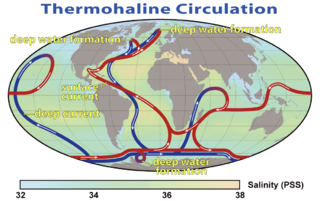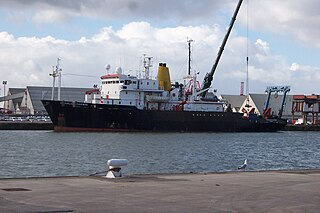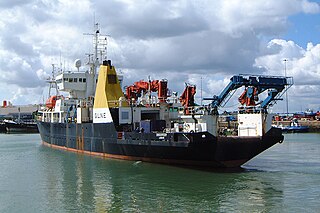
Oceanography, also known as oceanology, is the study of the physical and biological aspects of the ocean. It is an important Earth science, which covers a wide range of topics, including ecosystem dynamics; ocean currents, waves, and geophysical fluid dynamics; plate tectonics and the geology of the sea floor; and fluxes of various chemical substances and physical properties within the ocean and across its boundaries. These diverse topics reflect multiple disciplines that oceanographers blend to further knowledge of the world ocean and understanding of processes within: astronomy, biology, chemistry, climatology, geography, geology, hydrology, meteorology and physics. Paleoceanography studies the history of the oceans in the geologic past.
The National Oceanographic Data Center (NODC) was one of the national environmental data centers operated by the National Oceanic and Atmospheric Administration (NOAA) of the U.S. Department of Commerce. The main NODC facility was located in Silver Spring, Maryland and was made up of five divisions. The NODC also had field offices collocated with major government or academic oceanographic laboratories in Stennis Space Center, MS; Miami, FL; La Jolla, San Diego, California; Seattle, WA; Austin, Texas; Charleston, South Carolina; Norfolk, Virginia; and Honolulu, Hawaii. In 2015, NODC was merged with the National Climatic Data Center and the National Geophysical Data Center into the National Centers for Environmental Information (NCEI).

The National Oceanography Centre Southampton (NOCS) is a centre for research, teaching, and technology development in Ocean and Earth science. NOCS was created in 1995 jointly between the University of Southampton and the UK Natural Environment Research Council and is located within the port of Southampton at a purpose-built dockside campus with modern facilities. In 2010 the University and NERC components demerged, and the NERC-managed component became the National Oceanography Centre. The two components of NOCS continue close collaboration through the jointly run Graduate School, shared research facilities and laboratories, complementary research groups, and many joint research grants and publications. The University component “Ocean and Earth Science, National Oceanography Centre Southampton” (OES) is part of the Faculty of Natural and Environmental Sciences, (FNES). It was ranked 30th in the world for Earth and Marine Sciences by the QS World University Rankings in 2014.

The RRS Charles Darwin was a Royal Research Ship belonging to the British Natural Environment Research Council. Since 2006, she has been the geophysical survey vessel, RV Ocean Researcher,
A Royal Research Ship (RRS) is a merchant navy vessel of the United Kingdom that conducts scientific research for Her Majesty's Government. Organisations operating such ships include; the Natural Environment Research Council (NERC), the British Antarctic Survey (BAS) and the National Oceanography Centre (NOC). A warrant from the Queen is required before a ship can be designated as an RRS.

The Census of Marine Life was a 10-year, US $650 million scientific initiative, involving a global network of researchers in more than 80 nations, engaged to assess and explain the diversity, distribution, and abundance of life in the oceans. The world's first comprehensive Census of Marine Life — past, present, and future — was released in 2010 in London. Initially supported by funding from the Alfred P. Sloan Foundation, the project was successful in generating many times that initial investment in additional support and substantially increased the baselines of knowledge in often underexplored ocean realms, as well as engaging over 2,700 different researchers for the first time in a global collaborative community united in a common goal, and has been described as "one of the largest scientific collaborations ever conducted".

The Environmental Science Services Administration (ESSA) was a United States Federal executive agency created in 1965 as part of a reorganization of the United States Department of Commerce. Its mission was to unify and oversee the meteorological, climatological, hydrographic, and geodesic operations of the United States. It operated until 1970, when it was replaced by the new National Oceanic and Atmospheric Administration (NOAA).

RRS Discovery was a British Royal Research Ship operated by NERC.
The Marine Institute is the national agency responsible to the Irish government for advice on and implementation of marine research, technology, development and innovation policy, and marine research services. Its official vision is of
“A thriving maritime economy in harmony with the ecosystem and supported by the delivery of excellence in our services."

The British Oceanographic Data Centre (BODC) is a national facility for looking after and distributing data about the marine environment. BODC is the designated marine science data centre for the UK and part of the Natural Environment Research Council (NERC). The centre provides a resource for science, education and industry, as well as the general public. BODC is hosted by the National Oceanography Centre (NOC) — primarily at its facility in Liverpool, with small number of its staff in Southampton.

An executive agency is a part of a government department that is treated as managerially and budgetarily separate, to carry out some part of the executive functions of the United Kingdom government, Scottish Government, Welsh Government or Northern Ireland Executive. Executive agencies are "machinery of government" devices distinct both from non-ministerial government departments and non-departmental public bodies, each of which enjoy a real legal and constitutional separation from ministerial control. The model was also applied in several other countries.

Prem Chand Pandey is an Indian scientist and academic in the fields of Satellite Oceanography, Remote Sensing, Atmospheric Science, Antarctic and Climate Change
The Institute for Marine and Antarctic Studies (IMAS) is a teaching and research institute of the University of Tasmania in Hobart, Tasmania. IMAS was established in 2010 building upon the university's partnership with CSIRO Oceans and Atmosphere and the Australian Antarctic Division in cooperative Antarctic research and Southern Ocean research.
The Centre for Marine Living Resources & Ecology (CMLRE) is a research institute in Kochi, Kerala under the Ministry of Earth Sciences, Government of India with a mandate to study the marine living resources. Today, apart from implementing various research projects of the ministry, the institute also manages and operates the Fishery Oceanographic Research Vessel (FORV) Sagar Sampada.
John Graham Shepherd CBE FRS is a British Earth system scientist, Emeritus Professor at University of Southampton, and a former director of the National Oceanography Centre, Southampton. He has worked on a wide range of environment-related topics, including the transport of chemical tracers in the atmospheric boundary layer and in the deep ocean, the management of marine fish stocks, and the dynamics of the Earth system. More recently he led a comprehensive review of geoengineering for the Royal Society.

Shailesh Nayak is an Indian scientist and former secretary of Ministry of Earth Sciences, Indian government between August, 2008 and August, 2015. He was also the Chairman of Earth Commission in India. He served as the interim chairman of ISRO between 31 December 2014 and 11 January 2015.
Gerold Siedler is a German physical oceanographer. He is professor emeritus at the Christian-Albrechts University of Kiel and at the GEOMAR Helmholtz Centre for Ocean Research Kiel.









